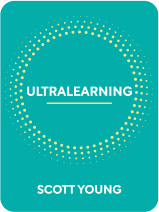

This article is an excerpt from the Shortform book guide to "Ultralearning" by Scott Young. Shortform has the world's best summaries and analyses of books you should be reading.
Like this article? Sign up for a free trial here .
What are the benefits of learning Scott Young’s Ultralearning techniques? How could ultralearning help improve your work and personal life?
Ultralearning is a study strategy created by Scott Young. There are many benefits to practicing ultralearning techniques, and this article will cover the top four.
Continue on to learn about the benefits of Scott Young’s ultralearning method.
Scott Young’s Ultralearning Techniques
Going to college to get a bachelor’s degree used to be sufficient to find a good job, but now it’s not enough. Many modern careers demand a skill set that you can’t pick up as you go, and most organizations increasingly ask for greater knowledge from their employees than is supported by access to formal education. The book Ultralearning teaches you how to stay relevant in your field, advance your career, and master any skill you desire by using Scott Young’s “ultralearning” techniques.
Ultralearning is a strategic approach to learning that is intensive and self-directed. What does all of this mean?
- Intensive learning is learning as deeply as possible at an accelerated pace (in contrast to leisure learning, done at a relaxed pace).
- A strategy is an approach to solving a problem or achieving a goal.
- A self-directed learning strategy is a method for achieving a learning goal that works best for you.
There are many variations of the Scott Young’s ultralearning techniques, but ultralearners share several characteristics:
- They work independently (but not necessarily alone).
- They’re obsessive about improving their learning process.
- They’re motivated primarily by a love of learning (in contrast to being motivated by the prestige of credentialed achievements).
- They constantly push the limits of their intellectual comfort zones.
In this article, you will learn the benefits of ultralearning and why you should learn the techniques.
Benefit #1: Ultralearning Increases Your Competitive Advantage
Mastering Ultralearning will help you quickly acquire new skills and perform at the level of your competitors, which is more critical than ever because of skill polarization—new technology and globalization have reduced the need for medium-skill-level jobs. Low-skill jobs generally can’t be outsourced, and most prefer to keep high-skill jobs (like product design) “at home,” but medium-skill jobs are outsourced regularly. Remaining jobs require either an advanced skill set (for example, that of engineers) or lower-level skills (for example, those of retail). Therefore, modern success requires you to upgrade your skill level or take jobs requiring less skill.
Benefit #2: Ultralearning Is an Effective Alternative to Formal Education
Ultralearning is an effective solution whether you need to fill in gaps from your existing education, or you need an alternative to traditional higher education. The new requirements for high-skill work have made a college education more important than ever, but higher education costs have skyrocketed. Debt for new graduates is now the norm, and because the rate of increase in costs exceeds the rate of inflation, college may not be worth it unless you’re studying something that will guarantee you high-paid work upon graduation. If you can afford college, even the most prestigious schools are not necessarily equipped to support you to thrive in the new “high skill” environment.
Benefit #3: Ultralearning Is Time Efficient
Being self-directed, Ultralearning allows you to tailor your learning schedule to align with your availability and focus on the skills you most want to acquire. The energy it takes to learn rapidly is of greater long-term value than toiling away at a job where you use a repetitive skill set. And, because the economy is so unpredictable, industries are always changing at a rapid pace, which means staying relevant requires constant learning and upgrading of skill sets.
A Note on Time Commitment
While ultralearning often requires a time commitment, you can still accomplish a lot of learning even if you have a busy schedule. There are three strategies for this:
Strategy #1: Practice ultralearning on a part-time basis.
The key aspects of ultralearning are efficiency and intensity. You can apply these aspects whether you’re able to devote five hours or 50. You can even learn at a leisurely pace, as long as you’re using the most efficient techniques during your study periods.
Strategy #2: Practice ultralearning during breaks (from school or work).
Breaks can be anything from a two-week Christmas break from school, a sabbatical from work, short-term unemployment, and so on. Again, as long as you use strategies that are ruthlessly efficient, you can use any gap of time successfully.
Strategy #3: Integrate ultralearning into existing habits.
You already have personal hobbies and skills you seek to learn. You can apply ultralearning strategies to these existing habits or needs. For example, if you’re using Duolingo for Spanish in your free time, you might as well apply ultralearning methods to that endeavor.
Benefit #4: Ultralearning Increases Overall Well-Being
Using ultralearning to overcome personal limitations and pursue your potential can have a positive impact on your overall well-being (for example, by improving your confidence). Additionally, ultralearning is a tool of adaptability to combat a changing environment. The world is going to continue to change rapidly, and learning difficult skills efficiently and deeply will be critical for thriving under these conditions.
A Note on Talent
Is talent or skill at the core of a person’s success? Author Young believes talent is undeniable and an important factor in performance, but the strategy is also important. Using ultralearning, you can develop a strategy that enhances your learning regardless of talent or intelligence.

———End of Preview———
Like what you just read? Read the rest of the world's best book summary and analysis of Scott Young's "Ultralearning" at Shortform .
Here's what you'll find in our full Ultralearning summary :
- How a formal education doesn’t open the doors it once could
- The 9 core principles that can help you master any skill
- How to create a self-directed learning project to help you advance in your field






